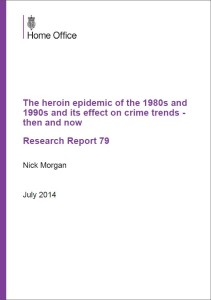Heroin epidemics send crime rates up and down
A recent Home Office report authored by Nick Morgan makes a convincing case that the heroin epidemics of the 1980s and 1990s are the main cause of both the unprecedented surge and recent fall in crime rates. Although Morgan admits that his methodology is not bullet-proof owing to limitations on the data available, he makes, to my mind, a very convincing case.
[divider]
The narrative
Morgan summarises his argument in the following terms (page 58): “Following the opening of a new heroin supply route in the late 1970s, England and Wales had a significant drugs epidemic, or wave of epidemics, through the 1980s and early 1990s. This produced a cohort of heroin users, many of whom also used crack as their drug misuse developed.
The cohort was not homogeneous. Many (perhaps most) did not become either long-term addicted or prolific criminals and some were offenders before using opiates or crack. While many probably had the clustering of crime risk factors that could have marked them out for a criminal career in the absence of the epidemic, the cohort probably also included a number of individuals whose only crime risk factor was a susceptibility to peer influence at a time when heroin use was spreading in their area. For the first group, heroin use may have accelerated and extended an existing criminal career and for some of the second group heroin may have kick-started a criminal career.
Crimes committed were mainly minor theft offences. As a result, this cohort became prominent in the offending population and probably had a large impact on total crime, which is dominated by acquisitive crime. The crime rise was steady during the 1980s, when the majority of England and Wales remained relatively unaffected by the epidemic. It then increased very rapidly in the 1990s as every police force area except Merseyside reached its peak of opiate/crack use.
Once the epidemic had spread across England and Wales and all susceptible individuals had been ‘exposed’, the number of new users probably decreased just as quickly as it had risen. Crime therefore began to fall; quickly at first as the less-recalcitrant users quit in significant numbers. But then more steadily as the population whittled down to more established users.”
[divider]
The evidence
The most convincing aspects of Morgan’s hypothesis are the way that is able to match local crime rates with peak levels of heroin use (although, unfortunately, he has to use the now-defunct Addicts Index as the indicator of heroin dependency). Atypical areas where heroin use peaked earlier (Merseyside, Edinburgh and the Republic of Ireland) or not at all (Northern Ireland) show very close correlation between the rise and fall of crime rates.
[divider]
Recession is not so important
One criminological theory, to which I was subscribed myself, was that crime rates were related to the general economic situation. It seemed natural that crime would rise when more people were unemployed and lacking the means to buy goods and services from their wages. However, criminologists have been puzzled by the way in which the crime rate has continued to fall markedly since the most recent recession. Morgan argues that the continued fall in acquisitive crime rates correlates with a slowly shrinking heroin/crack using population, rather than with economic factors.
[divider]
Conclusion
This is only a brief summary of Morgan’s argument and those with more sophisticated research skills than mine may be able to pick holes in his argument. Nonetheless, I strongly recommend reading the report in full if you are interested in either the causes of crime or the drug-crime nexus. Is heroin really the single most important cause of crime in the UK over the last 30 years? I would be very interested to read your comments below.








13 Responses
Causality is confusing but the link is logical. Similarly recession reduces alcohol consumption and demographics mean that adolescent crime is diluted. Another factor worth tracking is the end of corporal punishment in schools circa 1980 and wider cultural changes in education provision.
Thanks Richard, I certainly find the argument persuasive although as you say it’s never straightforward causation.
It offers good support for a long established theory, but it does feel like Morgans paper, and your discussion of it, miss out the elephant in the room: prohibition. The illegality of heroin dramatically inflates prices, creates the environment in which a violent illegal trade can thrive, criminalises uses, and pushes low income dependent users into high volumes of aquisitve property crime. Where it’s been prescribed, (switzerland for example – and to a lesser extent elsewhere including some UK trials) crime rates plummets for obvious reasons (along side many public health gains). So the pattern of offending witnessed, whilst driven by heroin, is specifically driven by heroin in combination with the policy of prohibition and criminalization of its use and supply. The legal policy environment is a far bigger driver of offending than the use itself.
Hi Steve
Thanks for the comment. Yes, of course it’s difficult to disentangle the illegal status of heroin.
I understand the pragmatic, harm reduction arguments for prescribing heroin.
But I’m not sure that’s a sustainable long term approach and it clearly has a public health down side. Why not prescribe alcohol, cocaine and anything else?
My personal view is that small scale prescribing may reduce crime, but large scale prescribing in the UK could easily result in more dependency and more crime.
I doubt whether we’ll ever get the chance to find out though…
It
Why would large-scale prescribing of heroin result in more ‘dependency’ (regular heroin use)? I don’t see any evidence for this argument from any of the research on heroin prescribing – and since prescribing heroin to many/most heroin users would very probably reduce the number of heroin dealers, as well as turning heroin use into an unsexy medical condition, its more likely to lead to a reduction in illicit heroin use.
Your other point was ‘Why not prescribe alcohol, cocaine and anything else?’ The most obvious answer to this question is that heroin is non-toxic and fairly harmless to regular users in pure pharmaceutical form, while cocaine and – especially – alcohol are far more toxic and problematic. In addition, there is no need to prescribe alcohol since it is already legally available, while heroin is prohibited, which forces its users to turn to criminal gangs and criminal activity in order to pursue their lifestyle. I have to agree with Steve Rolles that it is the prohibition of heroin which ratchets up its harmfulness to the maximum level possible. Long-term heroin users who have failed to ‘recover’ despite several treatment episodes are particularly likely to show overall benefits for themselves and their community. As Farrell & Hall (2015) concluded from their recent systematic review of heroin prescribing to illicit heroin users, “The question remains, what else is required to convince policy makers of the value of such treatment for severe and refractory heroin dependence?’
Slight return: in the last sentence of my previous reply, I meant to refer to Farrell & Hall’s editorial comments (in British Journal of Psychiatry) on Strang et al’s (2015) ‘systematic review and meta-analysis of randomised trials of diamorphine-prescribing as treatment for refractory heroin addiction’ http://bjp.rcpsych.org/content/207/1/5
Thanks for your comment, Russell. I think my main point is that the results of legalising heroin are unforeseeable and it’s hard to imagine any politicians letting the genie out of the bottle to find out…
Hi Russell … I understand your point, but surely Strang et al’s (2015) review, along with other research, provides growing evidence which makes the outcomes of prescribing diamorphine much more predictable – including improved retention, reduced use of illicit heroin, reduced mortality, reduced health problems, and reduced acquisitive crime. And though Strang et al’s review focused on ‘severe and refractory’ heroin users, these are (depending on definitions) likely to comprise the majority of heroin users in Britain (over half of England’s estimated quarter-million illicit opiate users in 2011/12 were aged over 35 years – Hay et al. 2013). Strang et al’s review also provides evidence of the cost-effectiveness of and public support for heroin prescribing programs. To get to the point, our politicians may be unwilling to ‘let the genie out of the bottle’, but this has more to do with their own myths and prejudices about heroin – and with whether supporting diamorphine prescribing is a vote-winner – rather than their impartial consideration of the growing evidence about the probable (positive) outcomes of prescribing diamorphine to heroin users.
I just don’t think research can equip us to know what would happen in a different future. How many prescribed users would sell on their scripts, how many people would opt for free heroin instead of recovery? Why users of other drugs, including alcohol, shouldn’t request free prescriptions? I’ve no idea whether heroin prescription would be a harm reduction triumph or an unmitigated disaster, but that’s my point…
Just a brief reply to your points: (1) the evidence suggests that selling of scripts by people prescribed diamorphine is very rare – indeed, why would a heroin user sell their pure unadulterated diamorphine script (to buy adulterated illicit brown heroin? Unlikely!). Anyway, illicit brown heroin is readily available to those who want it, and much cheaper than diverted pharmaceutical heroin; (2) apart from diamorphophobia (Strang et al. 2015), what are the objections to some heroin users (particularly those for whom other treatments were ineffective) opting for long-term prescribed diamorphine instead of recovery, as long as this can continue to be shown to reduce more harm (health problems, deaths, crime, etc)? Heroin intoxication lasts about 30 to 60 minutes, after which users mental states are much the same as a non-user, i.e. they are capable of going about their business the same as anyone else (including recovering users); (3) unlike heroin users, users of alcohol can buy their (relatively cheap) drug, while users of other illicit drugs (eg. amphetamines) could also justifiably be considered for a maintenance prescription – though research would also be needed to confirm the harm-reduction potential of maintenance scripts of these drugs compared to their continued illicit use; (4) the only way we will ever know whether diamorphine prescribing reduces relevant harms and costs more than other interventions with illicit heroin users is to try it out (again) and evaluate it. Lastly, the main justification for prescribing diamorphine to illicit heroin users before we start looking at prescribing other drugs to those who use them is that diamorphine is relatively harmless when used under medical supervision – which is why we prescribe it as a painkiller to people with serious medical conditions like cancer…
You are wrong about the selling of Morphine being rare.
Myself I was an illicit drug user of heroin and crack cocaine for 20 years and my partner for almost 13yrs, I was in the middle of this drug period given Diamorphine Ampules as something to help me reduce my drug use and boy did it do that, within the first 2 wks i had paid bills that i hadn’t paid for months, i went food shopping which is something i never did because the money was always for my gear and it just went better and better for me, i started doing my house work and washing clothes and bathing everyday again, it was great i was able to breath again, i could not believe something had been found that could help me to this extent, it literally was a lifesaver for me until at 6wks I was called back into my local substance missuse service and i had the ampules taken off me there and then because I had already have a DVT in both legs and there is no way any doctor will prescribe ampules to anyone who has a DVT, I never sold my ampules in this time or gave any away and I was distraught when i had them taken off me, it felt like my life had been given to me again and ripped away, i couldn’t make sense of it and so my life went back to being a junkie and stealing to feed my habit however a few years later my partner who had been to the drug services many times and would not accept the oral green methadone because it made him vomit went one more time and got really angry because he said all they had to offer him was oral methadone and so it looked as if he was the only drug addict in the country they could not help he left that day the substance missuse service only for myself to get a phone call asking him to go back the day after, he had no phone of his ow at that time and they knew we were partners and when he went back the day after they gave him injectable methadone ampules and he’s been another who has never looked back and is now living a drug free and crime free life along with myself, i had taken drugs for a good few years more than my partner and i had moved away to another town and during this time my ex-husbands family had let my partner stay with them and after a year later he came to me in my new place, and we’ve never looked back, he always credits the ampules as being the thing that helped him sort himself out as he said it was his life and even if he was a junkie his life was still just as important as anyone else’s life. I also seen many other people getting these ampules but apparently after a couple of years of loads of people being on Diamorphine Ampules in one week everyone who was on them prescribed was called back into the service and had the diamorphine ampules taken from them and were given Methadone Ampules instead, their excuse was that the place that made diamorphine had not been able to produce anything like nearly as mucha as was needed and so they’d had to stop it for everyone…..that was one of the worst lie’s I ever heard and I found out some years later it was because of a secret trial they had been doing that they’d given them out to alot of people and thse secret trials had come to an end and that makes me mad how dare us drug addicts be treated like lab rats……. I knew lots of people on Diamorphine or Methadone Ampules as well as us 2 and I would say that 90% of these people got their lives and habits under control, apparently it was some trials they were testing out back then in my home town of Wigan in lancashire i think they should offer these ampules to everyone who injects especially in the early stages befoe they have chance to develop any DVT because of there addiction because with intravenous user it is known that you get addicted to the needle as much as anything else, they say couple’s cannot get drug free together but we did and I firmly believed it was my partner and him getting methadone ampules that was a big part of this…….my generation I am 47yrs old were the stolen generation as far as heorin was concerned it came from no where in the 80’s and 90’s and it raped us, everyone I knew was on heroin at one point it ruined loads of people’s lives and for years it ruined myself and my friends lives and our families we all had lost our children due to us using this drug some of us like myself were lucky enough to have family take these children and bring them up for us, and my findings in respect to heroin use going down is because our children grew up seeing what heroin did to their families and they wanted no part of it, my children and all of my friends children aren’t drug users, i just worry that it will be forgot about how bad it was and then the next generation will forget about it to and not realise how bad it is and was back then and it could start all over again, leap frogging a generation each time…I certainly hope not and i think the drug services need to up their game and start treating this issue seriously and try to fix it properly before the next lot come along and they will of learned nothing from it.
There was a social experiment in Wigan where I live in the 90s.
Give all Heroin addicts Morphine to see if the crime figures came down …Then when the social experiment was over and they were taking it back off everybody and blamed it on a shortage due to stuff going on in Afghanistan .